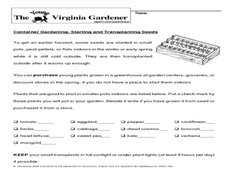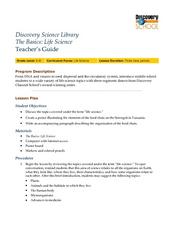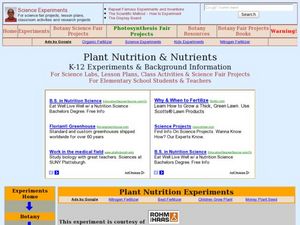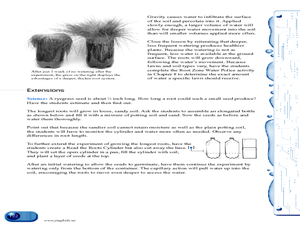Curated OER
SEEDS WE EAT
Students identify seeds humans eat and do not eat. Students make seed collections, using common kitchen foods. Students display seeds from the foods they serve and discuss them with their guests. Students complete activities which...
Curated OER
Wind Distribution of Weed Seeds
Students investigate how many seasons it would take for wind to disperse seeds one mile downwind from an initial growth of one spotted knapweed plant. They construct and use a wind tunnel as part of their experiment and graph their results.
Curated OER
Planting the Seed
Students plant their seeds and collect and organize their own materials for planting. They also set up their planters with wicks, fertilizer, potting mix, and seeds. Finally, students write their names on planter markers with a ball...
Curated OER
The Young Virginia Gardener: Growing Seeds Indoors: Seeds for Breakfast
In this gardening worksheet, students answer a set of questions about seeds eaten form breakfast in cereals, 10 questions total.
Curated OER
The Young Virginia Gardener: Container Gardening: Starting and Transplanting Seeds
In this gardening activity, students read a short passage about starting and transplanting seeds, then check names of plants they will put in their garden, noting whether they have started it from seed or purchased it from a store.
Curated OER
Seedy Business
Third graders investigate how a seed germinate to become a plant. They study a lima bean to review the parts of seeds.
Curated OER
The Basics:Life Science
Students explore concepts in life science using segments drawn from Discovery Channel. In this life science lesson, students participate in discussions about the food chain. Students create a poster to illustrate a predator and prey...
Curated OER
Growing Seeds
In this science worksheet, students read 5 different scenarios with varied growing conditions for plants. Students make a prediction for each: Will it grow a little, grow a lot, or not grow at all?
K12 Reader
What’s Eating You?
Introduce your class to producers, consumers, and pollinators with a reading passage. Class members read the text and respond to five related questions.
ARKive
Biodiversity and Evolution
Why is diversity in biology so important for an ecosystem? Explore biodiversity, evolution, and natural selection with a presentation for your biology class. It features clear information, activities for further understanding, and...
Education Outside
Grow an Art Garden: Plant a Rainbow
After a reading of Lois Ehlert's Planting a Rainbow, class members plan a rainbow garden, research growing cycles of the fruits and vegetables in their section, and then plant and maintain the garden.
Education Outside
Watering in the Garden
"When you are thirsty, does your mother pour water on your head?" Of course not! Nor do you pour water on the top of plants when watering them. Instruction like this are included in an activity that shows little learners how to water...
Curated OER
Sunny Sunflowers
First graders, after assessing how plants grow in relation to light, create models of sunflowers within a game to help them remember their science lesson. In addition, their visual models serve as a demonstration of photo tropism in...
Curated OER
Water Conditions
Learners investigate the importance of water in an environment with living things. in this water conditions lesson plan, students soak radish sees in water, vinegar, soap and alcohol. Learners remove the seeds, store them for a few days...
Curated OER
Tops and Bottoms
First graders classify vegetables by which parts are edible. In this plant biology lesson, 1st graders are read Tops and Bottoms by Janet Stevens, participate in a discussion of which plant parts are edible in the story, then sort real...
Curated OER
Mole Relations
Tenth graders investigate the mole using raisins, sunflower seeds and M&Ms candy. In this mole relations lesson plan, 10th graders create trail mix packets using the food items given to them using "dozen" as the units. Students write...
Curated OER
Jack and the Beanstalk
Third graders read a story and grow a beanstalk. In this literature and life science lesson, the class reads "Jack and the Beanstalk," then lists fairy tale elements and write a puppet show. The students plant pinto beans and observes...
Curated OER
Plant Nutrition and Nutrients
Students observe seeds growth and examine the different parts of the seedling. In this biology lesson, students compare the growth of seeds planted in soil and in hydroponics. They record their observations in their science journal and...
Curated OER
The Effects of the Calcium Ion on Cooked Dry Beans
Students investigate the effects of calcium ions on the quality characteristics of cooked dry beans. In this calcium ion and dry bean investigation lesson plan, students soak dry beans using 2 different soaking techniques and 2 different...
Curated OER
Germination Inhibitors
In germination experiment worksheet, students conduct the following lab activity. Students determine the effects of another tomato on germinating seeds. Students answer the following questions to analyze their experiment.
Curated OER
Room to Grow
Students examine radish plants and compare how they grew based on how closely the seeds were sown. In this life science lesson, students pretend to be growing plants crowded together, then examine how the radishes look based on how much...
Curated OER
Plant Life Cycle
In this exploring the processes from seed to reproduction of a plant online interactive worksheet, students read a passage explaining the plant life cycle and answer multiple choice questions about what they read. Students choose 8 answers.
Curated OER
Read The Roots
Learners experiment to determine the best watering schedule to use when growing grass. In this grass watering lesson, students examine rye grass seeds and discuss the role roots play in keeping grass healthy. They grow rye grass in clear...
Curated OER
Parental Genes
Eighth graders explore how different organisms pass their traits to their offspring. In this life science lesson, 8th graders differentiate recessive and dominant alleles. They predict the phenotype based on the genotype of an organism.

























